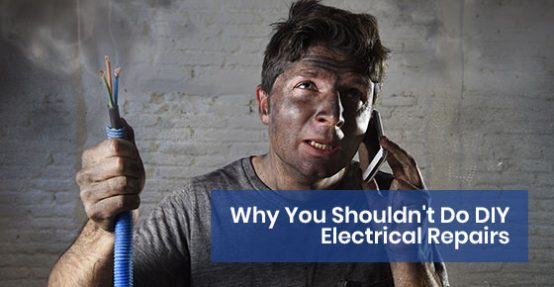
Electrical wiring is one of those tricky things which at first appear as a simple fix but isn’t. Of course, there are projects you can safely do at home, like swapping outlet covers or replacing light switches. For advanced jobs like upgrading current electrical wiring or maintenance following a power surge, it’s best to call the professionals.
A professional electrician completes 5000 hours, or 5-years of apprenticeship before becoming certified. The Electrical Contractors Association of Ontario also takes education into consideration. These capable tradespeople study electricity in depth before ever attempting to rewire something alone.
As one of the leading companies for electrical repairs Toronto offers, at Hi-Life Electric Inc., we have heard our fair share of DIY horror stories. As a proud member of the Toronto community, we care about the safety of our friends and neighbours. To minimize the risk involved in your DIY electrical repairs, we’ve compiled a list of reasons why you should avoid getting your hands dirty.
The greatest danger of amateur electrical work is electrocution. The amount of electricity it takes to run your home and business is more powerful than you realize. According to the Ontario Electrical Safety Authority, more than half of all Ontarians have been shocked by electricity in their lifetime. Some shocks are mild, causing sharp pain, heat, or a tingling sensation. More severe electrocution can cause permanent damage or be fatal.
An example of a seemingly simple task that could cause electrocution is swapping out the range hood over your stove and oven. You can buy a new range hood from any appliance store. Once you’ve got the new equipment, you must remove the old range hood, and here’s where things get tricky.
Your range hood is hooked up to electrical wiring which runs the lights and fan. If you unscrew your range hood and pull it down, the metal of the appliance will scrape against loose wires left dangling. This results in explosive sparks and smoke. All live wires must be capped before the range hood is removed. Prior to this, the power to that appliance should be switched off from the fuse box.
In Ontario, the Electrical Safety Code governs residential and commercial electricity. From wiring to connections – all changes you make to your home must meet the standards in this code to be allowed. While the chances of undergoing a random audit are slim for a homeowner, it could certainly come under review for a business owner.
Unless you’re familiar with the code, a DIY project could use unapproved strategies or materials. This could result in penalization or an order to reverse the work you’ve completed. Working with a licensed electrician guarantees all electrical repairs in Toronto are in direct agreement with the code.
Like any DIY project, homeowners who attempt electrical repairs in Toronto often do so to cut costs. If a job is done right from start to finish, there is a chance you could save some money. However, if your project results in a room without power, crossed wires, or other physical signs of an electrical problem, you’ll need to call an electrician for help.
Hi-Lite Electric Inc. electricians never tease or rejoice when a DIY project falls flat. We’re happy to help any way we can and always prefer you turn to us with an electrical issue than to try to deal with it alone. However, when we’re called to fix your current dilemma, rather than the original problem, it could mean undoing before redoing. This takes time and adds to the overall expense of your project.
Even with the best intentions and a handy electrician’s manual, attempting to wire something on your own could lead to disaster. A serious problem involving bad wiring is electrical fires. When live wires in your walls try to carry energy from a source to a destination but can’t, where does the energy go?
Electricity, by nature, continually seeks to close a circuit. When wires don’t connect properly, they leave room for rogue electrical currents, sparking, and other negative reactions.
Both residential and commercial buildings are constructed using combustible ingredients. Drywall, plywood, and installation are all quick to light. This becomes especially dangerous around winter when the air is dry and static levels increase.
Some projects sound easy but turn out far more complicated than you thought. This creates the issue of unfinished jobs. Not finishing a task like folding the laundry before bed is no big deal. Not finishing wiring the upstairs bathroom poses a significant risk of damage or injury. When DIYers get in over their heads, it causes a lot of frustration, choice words, and potential project abandonment.
If you insist on pursuing the DIY route, be sure you know everything required of your new project. Enlisting the expertise of an electrical contractor as a consultant could save you a lot of questions and concerns later. It will also help keep you safe.
For more information on why you shouldn’t do DIY electrical repairs, or for any electrical assistance, call Hi-Lite Electric Inc. at 1-416-800-5523 or contact us here.
© 2024 Licensed Electrical Installation & Service – Hi-Liteelectricinc.ca
All Rights Reserved.
Leave A Comment